Iranian Hunger Striker Vows To Keep Up Action Until IRGC Proscribed
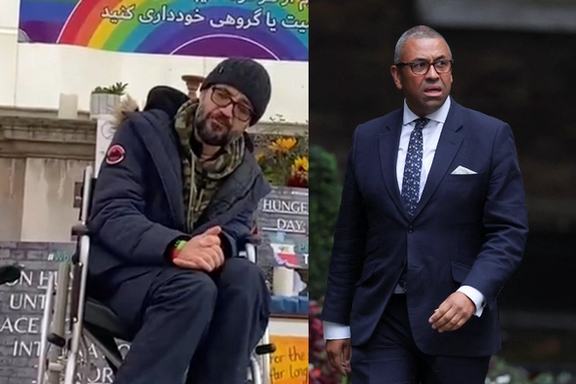
Iranian hunger striker Vahid Beheshti vowed not to give up his fight until the UK proscribes the IRGC.

Iranian hunger striker Vahid Beheshti vowed not to give up his fight until the UK proscribes the IRGC.
Beheshti’s comments came after the UK Foreign Secretary James Cleverly urged him to end his hunger strike amidst fears for his health.
Beheshti, 45, wants the UK to declare Iran's Islamic Revolutionary Guard Corps a terrorist organization. After surviving on water, coffee, and sugar cubes for 70 days, he is no longer able to walk.
The Conservative MP Nicola Richards raised the issue Tuesday in the House of Commons saying that “Vahid Beheshti was recently supported by 125 cross-party parliamentarians in his campaign to proscribe the IRGC”, which is “responsible for committing grotesque human rights abuses”.
Richards asked the Foreign Secretary if he recognized the urgency of the IRGC prescription.
Cleverly stated that Beheshti has met with ministerial colleagues, both in the Home Office and in the Foreign Office. “I do worry about his health and would urge him to stop his hunger strike.”
“With regard to Iran’s completely unacceptable behavior, we have responded by sanctioning the IRGC in its entirety and certain leaders of the IRGC specifically,” noted Cleverly.
He added: “We, of course, always keep options available and under review.”
Beheshti said such an answer is not acceptable - the UK like many other nations trying to tread a careful line on Iran in a bid to revive the nuclear deal.
Several members of parliament and thousands of British citizens demand the proscription of the IRGC.
On Saturday, thousands attended a rally in London and around the world in support of the campaigner.
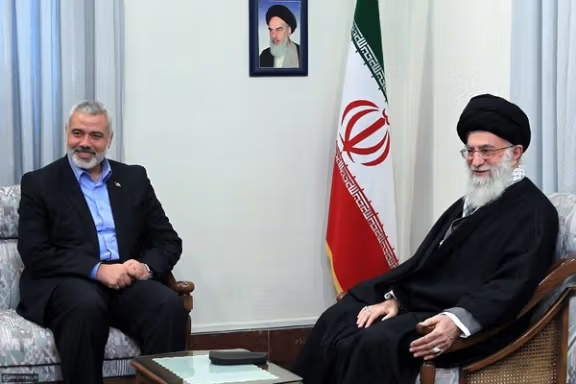
Iran International has learned that Palestinian militant group Hamas pressured the Islamic Republic into inviting its leader to Tehran hoping to get financial support.
According to our sources, the official invitation of Hamas leader Ismail Haniyeh was made following numerous requests because the Palestinian group is struggling with financial problems.
Haniyeh is expected to visit Iran in the near future, the Gaza-based terror group announced last Friday, April 28. Haniyeh's visit will be in relation to “political and field developments,” Hamas said, with Haniyeh expressing thanks and appreciation for the call, confirming his acceptance of the invitation and his intention to go to Tehran soon.
Iran International’s sources claimed that Hamas’ assets have been confiscated in several countries and currently the channels through which the group could receive aid in cryptocurrencies such as Bitcoin are also blocked. Therefore, the group sees the Islamic Republic as among its few sources of income.
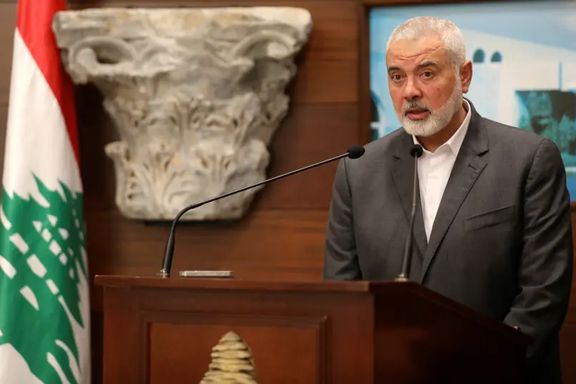
The sources added that although the Islamic Republic continues to provide financial aid to Hamas despite its own economic situation, Tehran is not satisfied with the performance of this group against Israel and is unlikely to give more aid to this group.
In December, Palestinian Arabic language daily newspaper Al-Quds cited informed sources in Lebanon as saying that the Islamic Republic had cut off its financial support for some Palestinian groups, without specifying which groups. General belief is that the Palestinian Islamic Jihad Movement, Hamas and the Popular Front for the Liberation of Palestine were the main recipients of financial aid from the Islamic Republic, among which Hamas and Islamic Jihad are known to be receiving the lion’s share of Tehran’s aid.
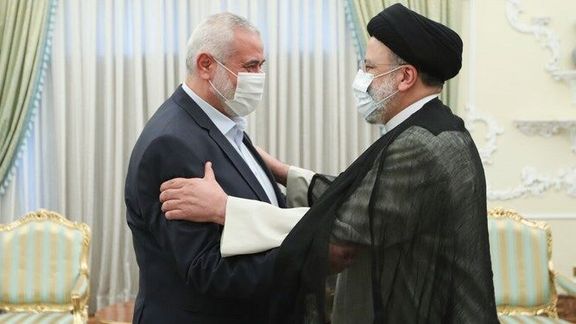
According to Al-Quds sources, these groups depend on Iran's financial aid to pay the salaries of their leaders and members as well as the expenses for other activities. The Islamic Republic’s cutting off aid caused serious problems both in the Gaza Strip and outside the Palestinian territories, to the extent that in some cases, these groups and their leaders have not been able to pay their utility bills, the paper reported.
In March 2022, Haniyeh revealed that the Islamic Republic paid a total of $70 million to Hamas to help it develop missiles and defense systems.
During an interview with Al-Jazeera, Haniyeh said different countries help in financing the group, but Iran is the biggest donor. The head of Hamas political bureau added that thanks to the aid from Iran, his group managed to have a comprehensive defense strategy in its confrontation with the Israeli military in the Gaza Strip in 2021.
He was referring to the two-week outbreak of violence in May 2021 that was called operation “Sword of Jerusalem” by Hamas but dubbed operation “Guardian of the Walls” by Israel. Hamas reportedly fired more than 4,000 rockets and missiles at Israel, most of which were intercepted by the Israeli Iron Dome defense system.
Haniyeh added that Iran backs the Shiite groups within its framework of support for the “axis of resistance” in the region – a term used by Tehran for its aligned militia forces -- noting that Tehran also supports Sunni movements against Israel.
Following normalization of its ties with Iran and Syria, Saudi Arabia also invited a senior delegation of Hamas to the kingdom in April. With China's mediation, Saudi Arabia normalized ties with Iran on March 10 and returned its relations with Syria to the level before the Syrian war. The Saudi embassies in Iran and Syria are scheduled to reopen in the coming weeks.
The Hamas-affiliated al-Resalah newspaper wrote said at the time that Haniyeh, and the head of Hamas Diaspora Office Khaled Mashaal, who have been living in Qatar in the past years, traveled to Riyadh at the head of a high-level delegation. In recent years, relations between Hamas and Saudi Arabia have been tense, with the Kingdom detaining some members of the group, accusing them of supporting terrorism. The tensions mounted as Hamas drew closer to the Islamic Republic.
In December, Lebanese media reported that Hezbollah is also facing financial problems due to the situation in Iran, as it cannot import Iranian goods to sell at a discount to its supporters.
Israeli Foreign Minister Eli Cohen earlier in the year that “Iran is like a cancer. It finances Hamas, the Jihad, and Hezbollah.” Late in April, Iran’s Foreign Minister Hossein Amir-Abdollahian met with heads of two of the regime's terror proxies -- Hezbollah and Palestinian Islamic Jihad Movement -- during a visit to Lebanon.
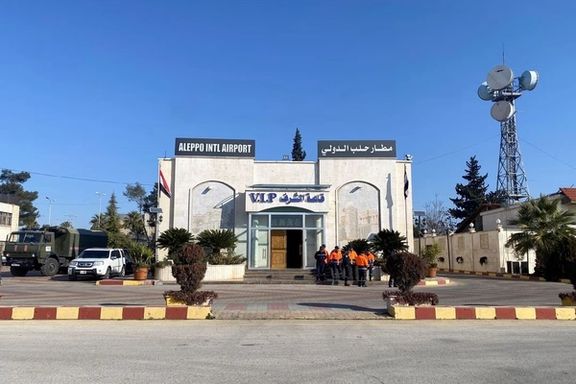
A soldier has been killed and seven others wounded, including 2 civilians, in an Israeli airstrike on Aleppo Airport on the eve of the Iranian president’s visit to Syria.
According to Syria's state news agency, SANA, Israeli warplanes attacked the airport and other sites near the city on Monday night, leaving the airport out of service.
The symbolic attack, one of a series in recent years in the shadow war between Israel and Iran, comes right before Iranian President Ebrahim Raisi travels to the Arab country at the official invitation of the Syrian president for a two-day visit.
Raisi’s visit is the first by an Iranian president since the start of Syria's civil war in 2011.
SANA claims Syrian air defense intercepted several incoming missiles following the Israeli invasion, a frequent claim by Damascus questioned by military analysts.
Israel has been attacking what it has described as Iran-linked targets in Syria since 2017, to prevent Islamic Republic forces getting entrenched near its northern borders and weapons reaching the Lebanese Hezbollah.
Iran intervened in the Syrian civil war as early as 2011 to defeat a rebellion against strongman Bashar Al-Assad.
Iran says its officers serve in an advisory role in Syria at the invitation of Damascus. Hundreds of Iranian forces and thousands of proxy militiamen including senior officers have been killed in Syria during the war.
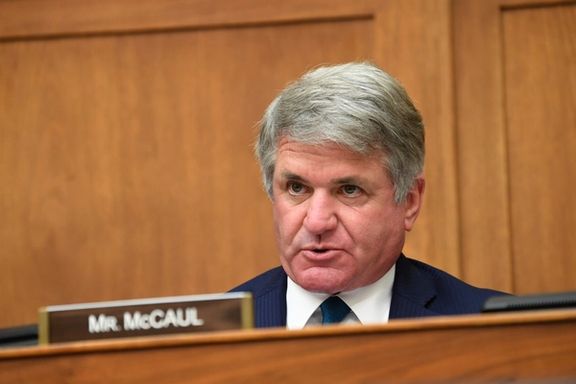
A bipartisan group of US lawmakers introduced legislation Monday to give permanent authorization to the president to implement sanctions on Iran, The Hill reported.
Iran’s sanctions Act (ISA) of 1996 has a sunset clause ending in 2026 and needs to be renewed by Congress, but the new legislation if approved would make the Act open ended until Iran is deemed to have changed its behavior.
The Solidifying Iran Sanction Act is sponsored by Rep. Michael McCaul (R-Texas), the chairman of the House Foreign Affairs Committee, and co-sponsored by 24 lawmakers in the House and Senate, including Reps. Susie Lee (D-Nev.) and Michelle Steel (R-Calif.)
“The Iran Sanctions Act is one of the most important tools in US law to compel Iran to abandon its dangerous and destabilizing behavior,” McCaul said in a statement.
“This bill takes the long overdue step of striking the arbitrary sunset from the law, so that sanctions will only be lifted if Iran stops its threatening behavior. Iran can’t run out the clock on US law,” he added.
Steel said Iran has “made clear it has no interest in participating in the international community or working towards peace.”
“The rogue state continues to make threats against democracy and actively sponsors terrorism around the world,” the lawmaker said in a statement. “Through this bipartisan, bicameral legislation, we can prevent Iran from possessing nuclear weapons and further jeopardizing global peace.”
Although the Biden Administration decided to hold nuclear talks with Tehran that could have left to the lifting of the most important sanctions, the diplomatic effort reached a dead end last September. In the meantime, Iran has been supplying weapons to Russia that are used against Ukraine.
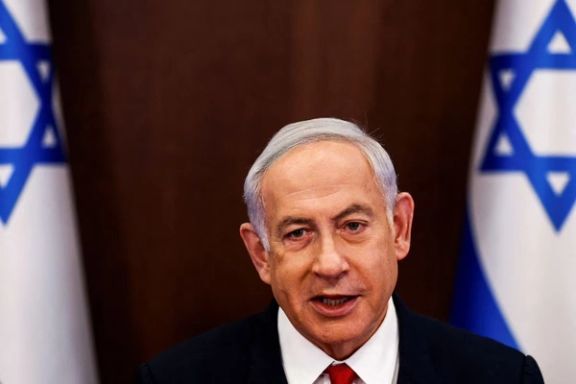
Israeli Prime Minister Benjamin Netanyahu said Sunday he would stop Iran from strangling the Jewish state with a "noose of terror."
Speaking at the weekly cabinet meeting, he said the country’s security personnel are “working on this matter around the clock … and we will continue to act both offensively and defensively against the aggression of Iran and its terrorist satellites”.
The Israeli Prime Minister's statements about the aggressions of the Islamic Republic come at a time when Iran’s foreign minister toured Lebanon’s border with Israel Friday during a visit to the Arab nation, and was documented looking out at the Jewish state his regime regards as an archenemy.
After meeting with Hezbollah Secretary General Hassan Nasrallah, Hossein Amir-Abdollahian took the tour along with several Lebanese parliamentarians and members of the Iranian-backed terror group.
“Positive developments in the region will lead to the collapse of the Zionist entity,” he said during his tour.
Mehr state news agency called Amir-Abdollahian's presence at the Israel-Lebanon border a "response" to the move by Israel's foreign minister, who visited Iran's borders during the opening of the country's embassy in Ashgabat, the capital of Turkmenistan.
Meanwhile, an Israeli air attack near the city of Homs hit Iranian targets early Saturday, while Syrian state media reported that some missiles were intercepted.
Meanwhile, Syrian Observatory for Human Rights, based in the United Kingdom, reported that Israeli missiles fired from warplanes destroyed a Hezbollah ammunition depot near Homs airport.

Iran’s rial hit its lowest point in one month on Monday, falling by 10 percent against the US dollar, as sanctions remain in place and the economy is in crisis.
The rial hit a low of 550,000 against the US dollar for the first time since April 1, when an apparent intervention by the Central Bank of Iran (CBI) had brought the rate down to around 500,000 rial for each dollar.
In early 2018, the rial was trading at around 40,000 when former US President Donald Trump decided to pull out of the JCPOA nuclear agreement and impose crippling sanctions on Iran. Since then, the rial has fallen by almost 14-fold.
A series of worker strikes have been underway since April 22, affecting energy, petrochemical, steel and other sectors, as the rial falls and inflation spikes.
Monthly salaries for ordinary workers that were equivalent to $220 one year ago are now around $120 in purchasing power.
An Iranian official said Sunday that workers’ pay covers expenses for just nine days of the month for a small family.
Negotiations in 2021 and 2022 to reach a new nuclear agreement reached a deadline last September, prompting markets to sell off rials. Since then, the currency has lost half its value.
In addition to the nuclear issue, Iran’s supply of weapons to Russia and its brutal and deadly crackdown on anti-government protesters in recent months have made further talks more difficult as the United States demands Iranian policy changes at multiple levels.